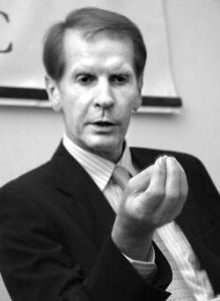Reinhard Schaefers, the new Ambassador of Germany to Ukraine, has had his first meeting with journalists in Kyiv. The large number of media people present at the meeting surprised him. The large turnout meant that Germany and its position is attracting a lot of attention in Kyiv.
“I am very glad to see how much the newly appointed ambassador of Germany interests you. I have been here for only two weeks, but it feels like two months,” said Schaefers, whose previous appointments were in Moscow and Paris. Since January 2001 he has been an ambassador and the FRG representative in the EU Council on Foreign Policy and Security.
The new German ambassador did not make any forecasts on the current difficulties of Ukrainian politics. “I have already learned that it’s not safe to make forecasts in Kyiv,” he explained, adding that he will make every effort to improve relations between Germany and Ukraine. “I will also do my best to bring Ukraine closer to the European Union,” he emphasized.
Schaefers sees his priority task as recasting the format of relations between Ukraine and the EU, starting in 2008. “This will happen when Germany heads the EU Council on Jan. 1, 2007. They are now busy preparing for this in Berlin and Brussels. There are a lot of suggestions, but everything depends on Ukraine’s development and stability.” Responding to journalists’ requests for parallels to be drawn between the recent election situation in Germany and the current one in the Ukrainian parliament, Schaefers noted that “some parallels are indeed noticeable,” since negotiations on forming a coalition took place in both countries. “There was only one government formed by a single political party in the post-war period in Germany. We have always had to form coalitions. As for the last election, a so-called broad coalition was formed for the second time in our history. If I understand the situation in Kyiv correctly, things are slightly different here, as a broad coalition means that two political forces that worked against each other during the elections have to join in order to form a coalition and government.”
The issue of a gas transportation consortium was raised during the meeting with the new German ambassador, who said that this is not a new idea. There are even documents about forming one, but those plans were never carried out. Schaefers reminded his listeners that Germany has always insisted on bringing all sides involved to the negotiating table. It means that the countries that produce gas, transport it, and consume it have to meet. This issue has not been finalized yet, but preparations are underway in Berlin and elsewhere.
“The same opinion was expressed by Germany at the G8 summit in St. Petersburg,” said the ambassador. “It’s important that the problem is understandable and our goals are clear.”
Since Mr. Schaefers has worked in the EU Council, it was interesting to hear what he thinks about the difficulties in the negotiations between the EU and Ukraine.
“We hope that a government will be formed in Ukraine, which will demonstrate its faithfulness to democracy and the legal foundations of statehood, and proceed to the same principal goals as the president. Those goals are to accept European democratic values and development in the direction of the EU. I have also spoken with people who might be able to take positions in the next government, no matter who will form it. And no one has told me that there are plans to abandon this outlined course.
“At stake here is the necessity for Ukraine to make a choice, and preferably within a few months. We are talking about an entirely new formulation of the whole set of laws regulating relations between Ukraine and the EU. The negotiations on this issue will start in a few months. A lot of areas have to be thoroughly discussed, including new ones, which will demand compromises. In any event, considering the situation that is developing dynamically, we have to talk about the legal framework of new relations between the EU and Ukraine. The negotiations will take more than a year. I will say that we need a capable partner with whom to negotiate.”
This is not the ambassador’s first visit to Kyiv. His family visited Ukraine in late 1980s during his diplomatic work in Moscow. In the 1990s he was a member of the official delegation during Chancellor Helmut Kohl official visit to Kyiv.
“But now that I have come, I am amazed at how much Kyiv has changed,” said Ambassador Schaefers. “Only the characteristic feature remains. The rest has changed dramatically: dynamic positive changes are obvious both in the economy and society.”







